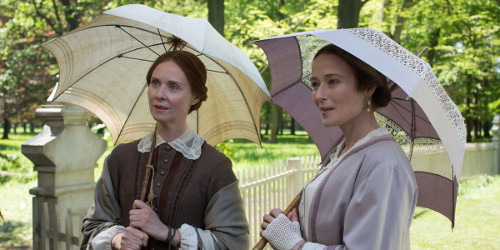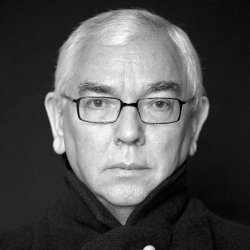By Lawrence Ferber

 Terence Davies
Terence DaviesBritish director Terence Davies has long been praised for his poetic, lyrical filmmaking, including 1992's autobiographical "The Long Day Closes," 2000's Edith Wharton novel adaptation "The House Of Mirth," and last year's "Sunset Song," based on Lewis Grassic Gibbon's Scottish novel. Perhaps, then, it's no surprise that the openly gay Davies has crafted another masterpiece with his biopic on poet Emily Dickinson, "A Quiet Passion."
The New Yorker's Richard Brody proclaimed "Passion" "an absolute drop-dead masterwork" after screening it at February's Berlin Film Festival, and Cynthia Nixon proves a revelation as Dickinson. Not exactly a spoiler, but her final stretch, as Dickinson succumbed to grueling illness at age 55, entails one of the most visceral, heart wrenching passages committed to modern cinema.
"What we don't understand these days, because we have so many drugs to kill pain, is they had nothing," Davies explains. "With the exception of Laudinum, a kind of opiate to which you could become addicted, if you had a serious illness you were in pain all the time and had to endure it. Emily had Bright's Disease, which is a disease of the kidneys, although she actually died of congenital heart failure. It was a painful death, and there was no palliative medicine at the end of life, you just had to endure it until you died, and that was a constant throughout the 19th century."
"A Quiet Passion" begins during the mid-1800s as the teenaged Dickinson (Emma Bell), a student at Mount Holyoke Female Seminary, decides to take up poetry. Obtaining the permission of her father, Edward (Keith Carradine), to write during evenings, she later gets published, but is told that women cannot reach the same literary heights as men. Once Nixon steps in as the adult Dickinson, we trace her relationships with best friend Vryling Buffum (Catherine Bailey), younger sister Lavinia (Jennifer Ehle) and brother Austin (Duncan Duff), and romantic longing for a married, emotionally unavailable Reverend (Eric Loren), and then spiritual crises, and, eventually, illness.
Dickinson only became known to the world after her death, and in fact almost two thousand poems, bound in some 40 volumes, were discovered after she passed: only a handful or two were published while she lived. Today, she is a household name. Despite the bleak aspects of Dickinson's life, Davies mines humor from the patriarchal stuffiness and formality of the era. Edward, a comparative progressive for the time and one-term Congressman, balks at the shocking spectacle of a woman who dares to sing during a night at the theater. "A gift is no excuse for a female to exhibit herself in that way," he clucks. Davies also keeps things light with zingy, aphorism-rich dialogue that falls somewhere between Oscar Wilde and Whit Stillman.
"I didn't want it all to be solemn; I want it to be fun as well," he says.
Davies adds that shooting the film in Antwerp, Belgium (standing in for 19th-century Massachusetts) proved a personal joy. Despite a professed distaste for "Sex and The City," he envisioned Nixon as his dream Dickinson from the get-go. "I just disagree with its subtext," he confesses of the HBO show and movie series, "that all you do is go to bed with people and buy things and then eat. I find that rather bleak. I have only watched it once. I just wanted to see Cynthia's reaction shots, which were always the truest. But I do disapprove of it!"
The actress had previously been attached to another film Davies hoped to mount some years back, financing for which never materialized. Her likeness to Dickinson and a mutual fondness for the poet's work (Davies incorporated some of Dickinson's poetry into his 2008 cinematic ode to Liverpool, "Of Time And The City") sealed the deal, and he wrote the script during 2012 with her specifically in mind.
In whittling down the events and people from Dickinson's life to form a two-hour movie that nonetheless covers a lot of ground and years, Davies's script ended up with hefty autobiographical elements from his own life (his agent told him it's his most autobiographical work yet, and Davies agrees). Like Dickinson, he was extremely close to his family members; as a youth was sent away to a school and suffered a deep homesickness; and they both struggled with spirituality.
"She was fierce in protecting her soul, but what comes across in the poetry is, what if you have a soul and there is no God?" Davies says. "What do you do? I was a very devout Catholic, and from age 15-22 I had my doubts. In those days you were told it was the work of the devil, and I fought with that for seven years. At 22, I didn't need it anymore."
However, Davies insists that the film is ultimately "a fictitious version of her life through my subjective prism, so you may not necessarily agree with it. You could only respond to those things in someone's life that have echoes of you. She had a correspondence with someone named the Master and nobody knows who it was. She improvised on the piano. All those things you cannot keep, because we are contractually obliged to bring in a movie of less than two hours."
The same rules apply to another biopic about a British poet, Siegfried Sassoon – who was also gay and a WWI hero – that Davies just completed a draft of. "Anybody who was anybody in the 20th century he met!" Davies says, laughing. "He knew everybody! So that's going to be played down, otherwise it becomes name-dropping."
Like countryman Ridley Scott ("The Martian," "Alien: Covenant"), Davies is proving quite prolific as a septuagenarian (he's 71), with an adaptation of Richard McCann's 2005 autobiography, "Mother of Sorrows," also in the works (Paul Dano may star). However, the dryly self-deprecating Davies notes that, while international acclaim is coming his way these days, he's not holding out hopes for a boyfriend, even despite a wave of popularity for "daddies" and websites and apps designed to connect them.
"Sex with a 71-year-old is too close to necrophilia for my taste," he quips, laughing. "I've been celibate since 1980. But I'm not physically attractive – I never was. Young, good looking, and very stupid – that's a combination nobody else will beat!"










